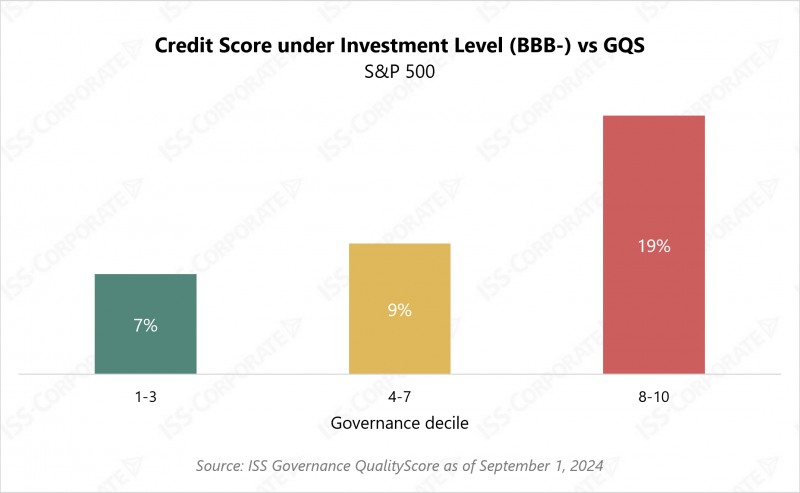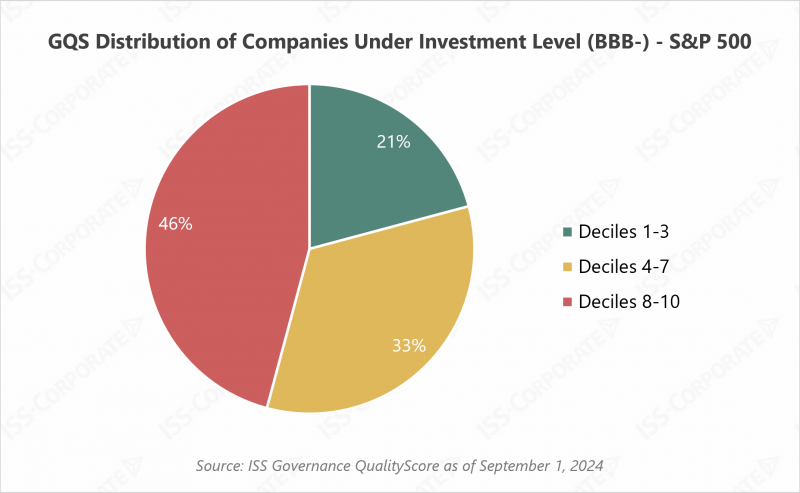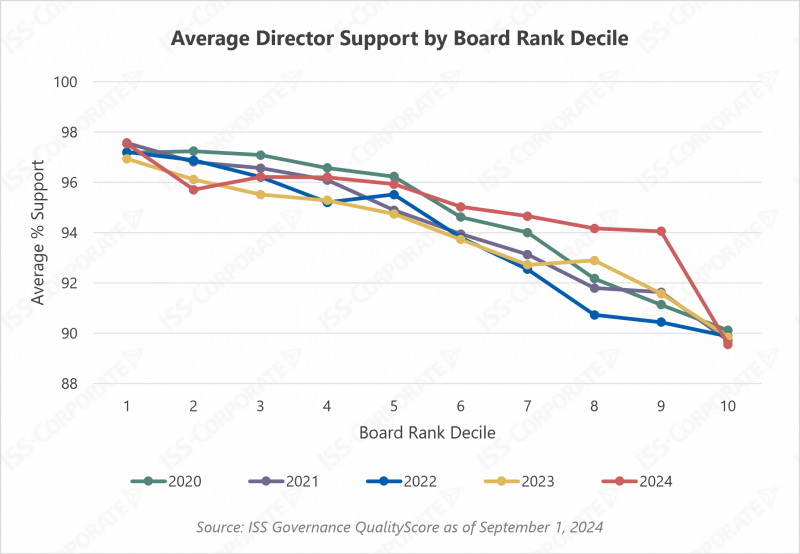Governance QualityScore as an Indicator of Risk and Investor Sentiment

Many market observers and investors believe that signs of poor corporate governance may be an effective risk indicator, providing early warning signs of other brewing problems. ISS’ Governance QualityScore (GQS), a decile ranking system based on a holistic assessment of companies’ governance practices, including board structure, compensation, shareholder rights, and audit, helps to quantify this risk. A score of 1 indicates the strongest governance practices (lower risk) while 10 suggests higher risk.
In this report, we examine four different gauges of market sentiment and compare them with GQS ratings. The first two – short interest ratios and credit ratings – are commonly accepted measures of perceived risk, while the other two are indicators of investor discontent as measured by vote support on director election and Say-on-Pay (SOP).
Short Interest and Governance QualityScore
Our analysis found that investor skepticism often accompanies poor governance structures. We identified the 100 most heavily shorted stocks in the Russell 3000 index based on short interest ratio: the number of shares sold short as a proportion of total trading volume. A high short interest ratio indicates investor conviction that a stock price will decline. Of the 100 most shorted stocks, almost half (48) have a GQS rating in the bottom third (8, 9, or 10), and 71 are in the bottom half (6-10). Only 14 of the companies among the top third of GQS ratings were among the 100 most shorted stocks.

Credit Rating and Governance QualityScore
Companies with poor governance practices are also more likely to have a credit rating that is below investment grade. In the S&P 500, 19% of companies in the bottom third of GQS rankings are junk-rated (below BBB-) while only 7% of the top third are below investment grade.

Among S&P 500 companies with a credit rating below BBB-, 46% have the weakest GQS scores (8-10) while 21% are among the highest rated (1-3). This shows that companies with elevated credit risks are more likely to exhibit poor governance practices.

Director Support and Governance QualityScore
Negative investor sentiments expressed through opposition to director elections are more pronounced at companies with poor GQS ratings. Directors at companies in the bottom decile of the GQS Board category saw more opposition to their elections, receiving on average 8% less support than those at the top-ranking companies. The correlation has been consistent for the past five years, with directors at companies with elevated board governance risks consistently receiving lower support than those with a robust board structure.

Say-on-Pay Support and Governance QualityScore
When investors have concerns over a company’s pay practices or performance, they often cast a “No” vote on its say-on-pay proposal, but their views and concerns are also reflected in the Compensation category of GQS. S&P 500 companies in deciles 1 to 7 get 32% more support on their say-on-pay proposals than those in the riskier decile. In the Russell 3000, the gap is also significant at 26%.

The world of corporate finances is an intricate system in which many elements converge. Investors continually monitor various risk signals, and concerns over a firm’s corporate governance could impact their investment decisions and stewardship strategies. Boards too should routinely monitor and assess their governance and take proactive measures where necessary to improve to mitigate risks and improve investor sentiments.
New Approach to SEC Rule 14a-8: What It Means for Companies
Governance, Risk & Resilience: Key Takeaways from London
Overstaying Their Welcome? A Close Look at Independent Directors Tenure in Hong Kong
Too Many Hats: Hong Kong Companies Pressed to Cut Down on “Overboarding”
FTSE 350: Board, Committee Chair Shareholder Support Can Signal Governance Concerns
2025 U.S. Proxy Season: Midseason Review Finds Sharp Drop in Shareholder Resolutions on Ballot
DExit: Signs of Discontent in Biggest Corporate Domicile?
The Evolving Landscape of Workplace Mental Health Management
Corporate Political Activity Disclosures: A Continued Priority for Investors and Companies
Governance QualityScore as an Indicator of Risk and Investor Sentiment

